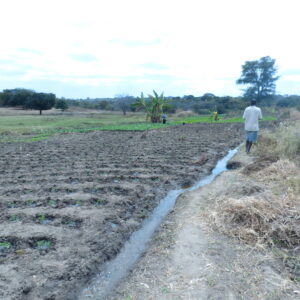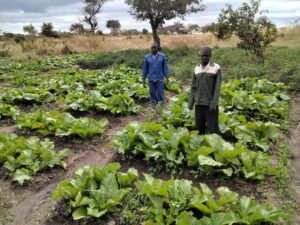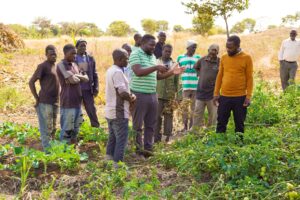Seeing Is Believing – By Leah Hood
I had the honor to visit Malawi this summer and visit many of our projects in Zowe. What I saw inspired me and strengthened my belief that Pamoza’s model was being implemented effectively. Individuals, families, and entire communities really are being transformed!
One of the highlights of my trip was my visit to the Pamoza Demonstration Farm. This expansive tract of land was donated by village leaders so local farmers can learn new techniques for increasing crop yield and caring for the land in a sustainable way. Importantly, all the methods being demonstrated are appropriate to the level of technology local farmers have access to. Which means there are no tractors or motorized machines- everything is done by hand.
What I saw was inspiring. Staff and volunteers hand-dug a series of fish ponds and are experimenting with ways to do aquaculture. There is a plan to construct a poultry house and use the chicken droppings as fertilizer for the garden and food for the fish. They planted a banana orchard and young banana plants were thriving. Pamoza’s vegetable gardens were green and lush.
This is what a farm is supposed to look like, right? Not quite.
During the dry season in Malawi, historically not much grows at all. Without rain, the crops don’t get watered. In dry months most people rely on the food they grew during the rainy season – and when that food runs out, people stay hungry.
But at the farm, Pamoza staff are demonstrating that it is possible to grow food year-round. They teach farmers to make natural irrigation systems through canals that direct ground water to crops. Local people come and learn how to dig out a pond to raise fish for food and for sale. Farmers can see how to construct a poultry barn for eggs and chicken meat. 
It was an inspiring visit. But does it work? It is one thing to have a great program model, but the proof is in the application. I wondered if people find this space valuable and if they had applied what they learned.
My answer came quicker than I anticipated. Later that same day we visited a group of families who have formed a farming cooperative. Earlier in the year, these farmers had received a loan of seeds from Pamoza and training at the demonstration farm.
When we arrived, we were welcomed with songs, dancing, and inspiring stories. But the thing the farmers were most excited about was to show us their fields. I followed the farmers and the Pamoza staff down a long path and I wondered if their gardens would live up to their enthusiasm.

What we saw exceeded our expectations. The fields were full of tomatoes. There were rows of broccoli rabe and other greens. Pepper plants were full of fruit. Essentially, it was a replica of what I had seen earlier in the day at the demonstration farm…. Pamoza’s model works!

With these flourishing gardens, these farmers are growing food to feed their families AND there is enough left over to sell at the market. This gives them income they can use to reinvest in their farm, improve their homes, and send their children to school.
These farmers learned new skills at the farm. But more importantly, what they saw was easily transferable and the impact was tangible. Their work with Pamoza had changed them. These farmers have grown their capacity and now have an ambitious vision for their fields, they are better able to support their households, and have money leftover to send their children to school.
Pamoza is working. By working together with local community members, our staff are helping to transform the lives of individuals and families. Initiatives like the Pamoza Demonstration Farm help entire communities reimagine what they are capable of.
The people of Malawi are creative. The people of Zowe have a new vision for what is possible when they work together and a new belief that they can positively impact the trajectory of their future.
